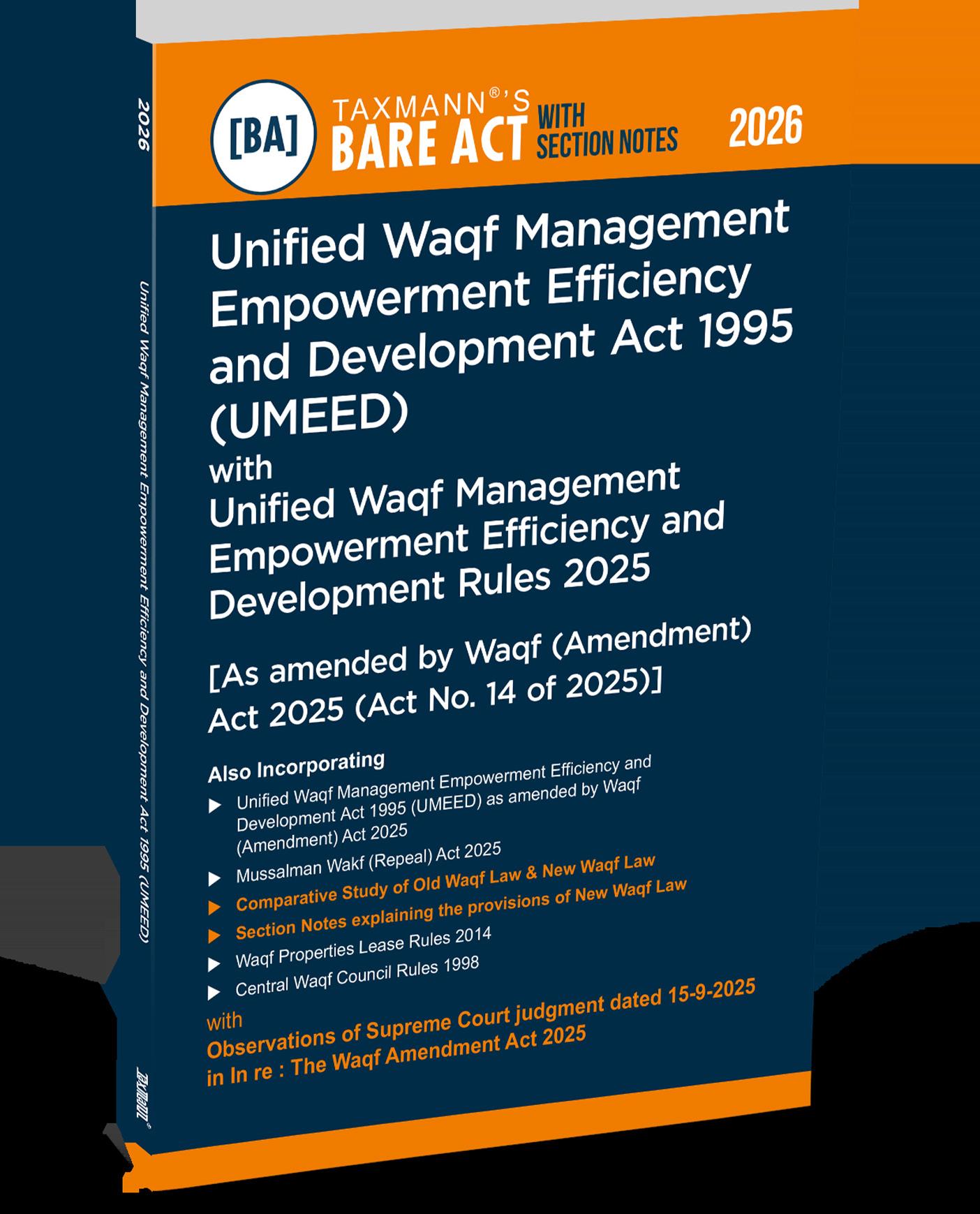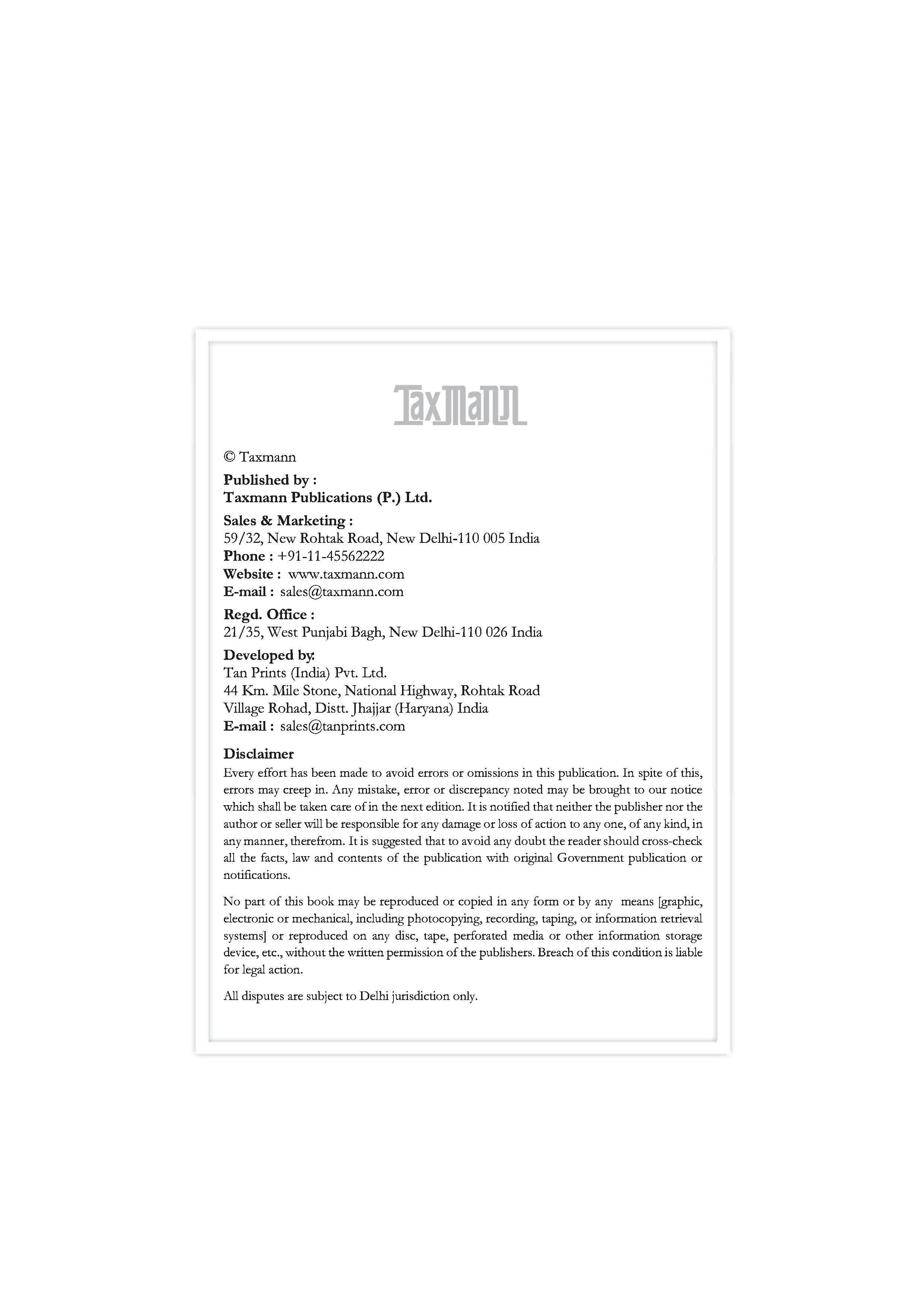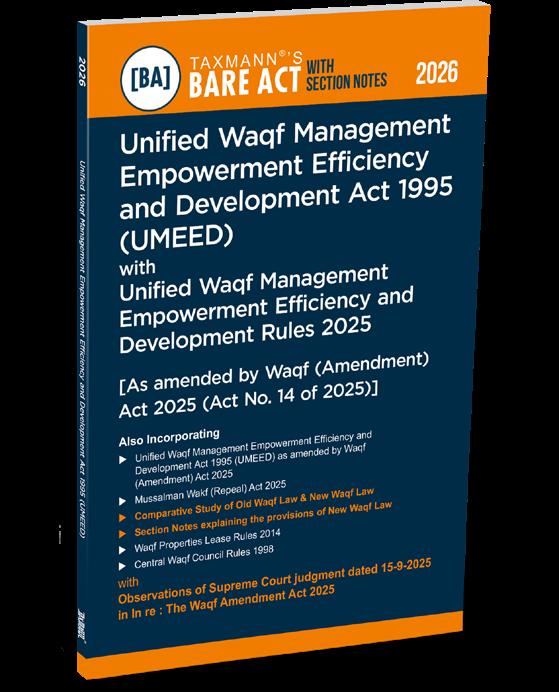







Amendments made by Waqf (Amendment) Act, 2025 at a Glance I-13
Key Observations of the Supreme Court in In re : The Waqf Amendment Act [2025 INSC 1116]
Comparative Study of Unified Waqf Management, Empowerment, Efficiency and Development Act, 1995 (hereinafter referred to as “New Waqf Law”) & Waqf Act, 1995 (hereinafter referred to as “Old Waqf Law”)
UNIFIED WAQF MANAGEMENT, EMPOWERMENT, EFFICIENCY AND DEVELOPMENT ACT, 1995
3A. Certain conditions of waqf
3B. Filing of details of waqf on portal and database
3C. Wrongful declaration of waqf
3D. Declaration of protected monument or protected area as waqf to be void 13
3E. Bar of declaration of any land in Scheduled or Tribal area as waqf 13
7.
8.
CHAPTER III CENTRAL WAQF COUNCIL
9.
20A. [Omitted by the Waqf (Amendment) Act, 2025, w.e.f. 8-4-2025]
tions
CONTENTS
27. Delegation of powers by Board 39
28. Power of District Magistrate, Additional District Magistrate or Sub-Divisional Magistrate to implement the directions of the Board 40
29. Powers of Chief Executive Officer to inspect records, registers, etc. 41
30. Inspection of records 41
31. Prevention of disqualification for membership of Parliament 42
32. Powers and functions of the Board 42
33. Powers of inspection by Chief Executive Officer or persons authorised by him 48
34. Recovery of the amount determined under section 33 50
35. Conditional attachment by Tribunal 50
CHAPTER V
REGISTRATION OF AUQAF
36. Registration 51
37. Register of auqaf 55
38. Powers of Board to appoint Executive Officer 56
39. Powers of Board in relation to auqaf which have ceased to exist 57
40. [Omitted by the Waqf (Amendment) Act, 2025, w.e.f. 8-4-2025] 58
41. Power to cause registration of waqf and to amend register 59
42. Change in the management of auqaf to be notified 59
43. Auqaf registered before the commencement of this Act deemed to be registered 59
CHAPTER VI
MAINTENANCE OF ACCOUNTS OF AUQAF
44. Budget 59
45. Preparation of budget of auqaf under direct management of the Board 60
46. Submission of accounts of auqaf 61
47. Audit of accounts of auqaf 62
48. Board to pass orders on auditor’s report 64
49. Sums certified to be due recoverable as arrears of land revenue 66
50. Duties of mutawalli 66
50A. Disqualification of mutawalli 66
51. Alienation of waqf property without sanction of Board to be void 67
52. Recovery of waqf property transferred in contravention of section 51 70
52A. Penalty for alienation of waqf property without sanction of Board 71
53. Restriction on purchase of property on behalf of waqf 73
54. Removal of encroachment from waqf property 73
55. Enforcement of orders made under section 54 74
55A. Disposal of property left on waqf property by unauthorized occupants 74
56. Restriction on power to grant lease of waqf property 76
57. Mutawalli entitled to pay certain costs from income of waqf property 77
58. Power of Board to pay dues in case of default by mutawalli 77
59. Creation of reserve fund 77
60. Extension of time 77
61. Penalties 77
62. Mutawalli not to spend any money belonging to waqf for self defence 80
63. Power to appoint mutawallis in certain cases 81
64. Removal of mutawalli 81
65. Assumption of direct management of certain auqaf by the Board 84
66. Powers of appointment and removal of mutawalli when to be exercised by the State Government 86
67. Supervision and supersession of committee of management 86
68. Duty of mutawalli or committee to deliver possession of records, etc. 89
69. Power of Board to frame scheme for administration of waqf 90
70. Inquiry relating to administration of waqf 92
71. Manner of holding inquiry 92
CHAPTER VII
FINANCE OF THE BOARD
72. Annual contribution payable to Board 93
73. Power of Chief Executive Officer to direct banks or other person to make payments 98
74. Deduction of contribution from perpetual annuity payable to the waqf 98
75. Power of Board to borrow 99
CONTENTS
76. Mutawalli not to lend or borrow moneys without sanction 99
77. Waqf fund 99
78. Budget of Board
79. Accounts of Board
80. Audit of accounts of Board
81. State Government to pass orders on auditor’s report 101
82. Dues of Board to be recovered as arrears of land-revenue 101
CHAPTER VIII
JUDICIAL PROCEEDINGS
83. Constitution of Tribunals, etc.
84. Tribunal to hold proceedings expeditiously and to furnish to the parties copies of its decision
85. Bar of jurisdiction of civil courts
86. Appointment of a receiver in certain cases 108
87. [Omitted by the Wakf (Amendment) Act, 2025, w.e.f. 1-11-2013] 108
88. Bar to challenge the validity of any notification, etc.
89. Notice of suits by parties against Board
90. Notice of suits, etc., by courts
91. Proceedings under the Act 1 of 1894
92. Board to be party to suit or proceeding
93. Bar to compromise of suits by or against mutawallis
94. Power to make application to the Tribunal in case of failure of mutawalli to discharge his duties 111
95. Power of appellate authority to entertain appeal after expiry of specified period 112
CHAPTER IX
MISCELLANEOUS
96. Power of Central Government to regulate secular activities of auqaf
97. Directions by State Government
98. Annual report by State Government
99. Power to supersede Board
100. Protection of action taken in good faith
101. Collector, members and officers of the Board deemed to be public servants
102. Special provision for reorganisation of certain Boards 115
103. Special provision for establishment of Board for part of a State 116
104. [Omitted by the Waqf (Amendment) Act, 2025, w.e.f. 8-4-2025] 116
104A. Prohibition of sale, gift, exchange, mortgage or transfer of waqf property
104B. Restoration of waqf properties in occupation of Government agencies to waqf Board
105. Power of Board and Chief Executive Officer to require copies of documents, etc., to be furnished
106. Powers of Central Government to constitute common Boards 117
107. Application of Act 36 of 1963
108. [Omitted by the Waqf (Amendment) Act, 2025, w.e.f. 8-4-2025] 119
108A. [Omitted by the Waqf (Amendment) Act, 2025, w.e.f. 8-4-2025] 119
108B. Power of Central Government to make rules
109. Power to make rules
110. Powers to make regulations by the Board
111. Laying of rules and regulations before State Legislature
Repeal and savings
Power to remove difficulties
MUSSALMAN WAKF (REPEAL) ACT, 2025
1. Short title and commencement
WAQF PROPERTIES LEASE RULES, 2014
1.
3. Restriction on grant of lease in certain cases
4. Procedure as to short duration lease of less than one year
5. Procedure for lease other than short duration lease
6. Invitation of bid for lease
7. Reserve price
8. Payment of security deposit
9.
of
12. Payment and recovery of lease
13. Time limit for decision on proposal for lease by mutawalli or
14. Submission of report by mutawalli to the
15. Submission of details of waqf
16. Prohibition to assign, sub-lease or
17.
18.
19.
20.
1.
CENTRAL WAQF COUNCIL RULES, 1998
13. Recruitment and service conditions of Secretary and employees of the Council 151
14. Control of the Fund 152
15. Power to sanction expenditure by Chairperson and Secretary 152
16. Annual Statement of Accounts 153
17. Powers of the Secretary in respect of staff and contingent expenditure 153
18. [Omitted by the Central Wakf Council (Amendment) Rules, 2012, w.e.f. 22-3-2012] 153
19. [Omitted by the Central Wakf Council (Amendment) Rules, 2012, w.e.f. 22-3-2012] 153
APPENDICES
Appendix I: WAQF (AMENDMENT) ACT, 2025 163
Appendix II: MUSSALMAN WAKF ACT, 1923 180
Appendix III: STATEMENT OF OBJECTS AND REASONS OF WAQF (AMENDMENT) BILL, 2024 203
Appendix IV: NOTES ON CLAUSES TO WAQF (AMENDMENT) BILL, 2024 205
Appendix V: STATEMENT OF OBJECTS AND REASONS OF MUSSALMAN WAKF (REPEAL) BILL, 2024 209

Unified Waqf Management, Empowerment, Efficiency and Development Act, 1995
[43 OF 1995]*
An Act to provide for the better administration of 1[Auqaf] and for matters connected therewith or incidental thereto.
BE it enacted by Parliament in the Forty-sixth Year of the Republic of India as follows:—
CHAPTER I PRELIMINARY
Short title, extent and commencement.
1. (1) This Act may be called the 2[Unified Waqf Management, Empowerment, Efficiency and Development] Act, 1995.
(2)It extends to the whole of India 3[***].
(3)It shall come into force in a State on such date4 as the Central Government may, by notification in the Official Gazette, appoint; and different dates may be appointed for different areas within a State and for different provisions of this Act, and any reference in any provision to the commencement of this Act, shall, in relation to any State or area therein, be construed as reference to the commencement of that provision in such State or area.
*Dated 22-11-1995.
1. Substituted for “Wakfs” by the Wakf (Amendment) Act, 2013, w.e.f. 1-11-2013.
2.Substituted “Waqf” by the Waqf (Amendment) Act, 2025, w.e.f. 8-4-2025. Earlier, “Waqf” was substituted for “Wakf” by the Wakf (Amendment) Act, 2013, w.e.f. 1-11-2013.
3.Words “except the State of Jammu and Kashmir” omitted by the Jammu and Kashmir Reorganisation Act, 2019, w.e.f. 31-10-2019.
4.Enforced with effect from 1-1-1996, vide S.O. 1007(E), dated 27-12-1995.
COMMENTS
SECTION NOTES
1.1 Short title [Section 1(1)]
Name of the Act is changed from ‘Waqf Act’ to Unified Waqf Management, Empowerment, Efficiency and Development Act, 1995 (UMEED).
1.2 Extent of the Act [Section 1(2)]
This Act applies to the entire country of India, as indicated by the phrase “extends to the whole of India”.
This means that the provisions of the Act are intended to govern all waqf properties and related activities within India.
1.3 Commencement of the Act [Section 1(3)]
The Act will come into force in any given State only when the Central Government issues a notification in the Official Gazette.
1.3-1 Flexibility in implementation
The Central Government has the power to appoint different commencement dates for different areas within a State or for specific provisions of the Act.
1.3-2 Commencement references
Any reference to the “commencement of this Act” will be interpreted as the date when the specific provision of the Act comes into force in a particular State or area.
1.4 Waqf (Amendment) Act, 2025
Vide Notification No. S.O. 1646(E), dated 8-4-2025, the Waqf (Amendment) Act, 2025 shall come into force from 8-4-2025
Application of the Act.
2. Save as otherwise expressly provided under this Act, this Act shall apply to all 5[auqaf] whether created before or after the commencement of this Act:
Provided that nothing in this Act shall apply to Dargah Khawaja Saheb, Ajmer to which the Dargah Khawaja Saheb Act, 1955 (36 of 1955) applies:
5a[Provided further that nothing in this Act shall, notwithstanding any judgment, decree or order of any court, apply to a trust (by whatever name called) established before or after the commencement of this Act or statutorily regulated by any statutory provision pertaining to public charities, by a Muslim for purpose similar to a waqf under any law for the time being in force.]
COMMENTS
SECTION NOTES
2.1 Broad application to all Auqaf
Section 2 establishes that the Act applies to all auqaf (Muslim endowments) regardless of:
When they were created—whether before or after the commencement of the Act.
5. Substituted for “Wakfs” by the Wakf (Amendment) Act, 2013, w.e.f. 1-11-2013.
5a. Inserted by the Waqf (Amendment) Act, 2025, w.e.f. 8-4-2025
2.2 Exception for Khawaja Dargah
Dargah Khawaja Saheb, Ajmer:
The provisions of this Act shall not apply to the Dargah because it is specifically governed by the Dargah Khawaja Saheb Act, 1955.
2.3 Exception for Public Charities or Trusts
Second proviso to section 2 specifically provides that nothing in this Act shall, notwithstanding any judgment, decree or order of any court, apply to a trust (by whatever name called) established before or after the commencement of this Act or statutorily regulated by any statutory provision pertaining to public charities, by a Muslim for purpose similar to a waqf under any law for the time being in force.
Definitions.
3. In this Act, unless the context otherwise requires—
(a) “beneficiary” means a person or object for whose benefit a 6[Waqf] is created and includes religious, pious and charitable objects and any other objects of public utility sanctioned by the Muslim law;
6a[(aa) “Aghakhani waqf” means a waqf dedicated by an Aghakhani waqif;]
(b) “benefit” does not include any benefit which a mutawalli is entitled to claim solely by reason of his being such mutawalli;
(c) “Board” means a Board of 6[Waqf] established under sub-section (1), or as the case may be, under sub-section (2) of section 13 and shall include a common 6[Waqf] Board established under section 106;
6a[(ca) “Bohra waqf” means a waqf dedicated by a Bohra waqif;]
(d) “Chief Executive Officer” means the Chief Executive Officer appointed under sub-section (1) of section 23;
6a[(da) “Collector” includes the Collector of land-revenue of a district, or the Deputy Commissioner, or any officer not below the rank of Deputy Collector authorised in writing by the Collector;]
(
e) “Council” means the Central 6[Waqf] Council established under section 9;
7[(ee) “encroacher” means any person or institution, public or private, occupying waqf property, in whole or part, without the authority of law and includes a person whose tenancy, lease or licence has expired or has been terminated by mutawalli or the Board;]
(f) “Executive Officer” means the Executive Officer appointed by the Board under sub-section (1) of section 38;
6a[(fa) “Government Organisation” includes the Central Government, State Governments, Municipalities, Panchayats, attached and subordinate offices and autonomous bodies of the Central Government or State Government,
6. Substituted for “wakf” by the Wakf (Amendment) Act, 2013, w.e.f. 1-11-2013.
6a. Inserted by the Waqf (Amendment) Act, 2025, w.e.f. 8-4-2025
7. Inserted by the Wakf (Amendment) Act, 2013, w.e.f. 1-11-2013.
or any organisation or Institution owned and controlled by the Central Government or State Government;
(fb) “Government property” means movable or immovable property or any part thereof, belonging to a Government Organisation;]
8[(g) “list of auqaf” means the list of auqaf published under sub-section (2) of section 5 or contained in the register of auqaf maintained under section 37;]
(h) “member” means a member of the Board and includes the Chairperson;
(i) “mutawalli” means any person appointed 8a[***] under any deed or instrument by which a 8b[Waqf] has been created, or by a competent authority, to be the mutawalli of a 8b[Waqf] and includes any person who is a mutawalli of a 8b[Waqf] by virtue of any custom or who is a naib-mutawalli, a khadim, mujawar, sajjadanashin, amin or other person appointed by a mutawalli to perform the duties of a mutawalli and save as otherwise provided in this Act, any person, committee or corporation for the time being, managing or administering any 8b[Waqf] or 8b[Waqf] property:
Provided that no member of a committee or corporation shall be deemed to be a mutawalli unless such member is an office bearer of such committee or corporation:
8c[Provided further that the mutawalli shall be a citizen of India and shall fulfil such other qualifications as may be prescribed: Provided also that in case a waqf has specified any qualifications, such qualifications may be provided in the rules as may be made by the State Government;]
(
j) “net annual income”, in relation to a 9[waqf], means net annual income determined in accordance with the provisions of the Explanations to sub-section (1) of section 72;
(k) “person interested in a 9[waqf]” means any person who is entitled to receive any pecuniary or other benefits from the 9[waqf] and includes— (i) any person who has a right to 10[offer prayer] or to perform any religious rite in a mosque, idgah, imambara, dargah, 11[khanqah, peerkhana and karbala], maqbara, graveyard or any other religious institution connected with the 9[waqf] or to participate in any religious or charitable institution under the 9[waqf]; (ii) the 12[waqif] and any descendant of the 12[waqif] and the mutawalli;
8. Substituted by the Wakf (Amendment) Act, 2013, w.e.f. 1-11-2013. Prior to its substitution, clause (g) read as under: ‘(g) “list of wakfs” means the list of wakfs published under sub-section (2) of section 5;’.
8a. Words “, either verbally or” omitted by the Waqf (Amendment) Act, 2025, w.e.f. 8-4-2025.
8b. Substituted for “Wakf” by the Wakf (Amendment) Act, 2013, w.e.f. 1-11-2013.
8c. Inserted, ibid.
9. Substituted for “wakf”, ibid.
10. Substituted for “worship”, ibid
11. Substituted for “khangah”, ibid.
12. Substituted for “wakif”, ibid.
12a[(ka) “portal and database” means the waqf asset management system or any other system set up by the Central Government for the registration, accounts, audit and any other detail of waqf and the Board, as may be prescribed by the Central Government;]
12b[(l) “prescribed” means prescribed by rules made under this Act;]
(m) “regulations” means the regulations made by the Board under this Act;
(n) “Shia 12c[waqf]” means a 12c[waqf] governed by Shia law;
(o) “Sunni 12c[waqf]” means a 12c[waqf] governed by Sunni law;
(p) 13[***]
(q) “Tribunal”, in relation to any area, means the Tribunal constituted under sub-section (1) of section 83, having jurisdiction in relation to that area;
14[(r) “waqf” means the permanent dedication by 14a[any person showing or demonstrating that he is practising Islam for at least five years, of any movable or immovable property, having ownership of such property and that there is no contrivance involved in the dedication of such property,] for any purpose recognised by the Muslim law as pious, religious or charitable and includes—
(i) 14b[***]
(ii) a Shamlat Patti, Shamlat Deh, Jumla Malkkan or by any other name entered in a revenue record;
12a. Inserted by the Waqf (Amendment) Act, 2025, w.e.f. 8-4-2025
12b. Substituted, ibid. Prior to its substitution, clause (l) read as under : ‘(l) “prescribed”, except in Chapter III, means prescribed by rules made by the State Government;’
12c. Substituted for “wakf” by the Wakf (Amendment) Act, 2013, w.e.f. 1-11-2013.
13. Omitted by the Waqf (Amendment) Act, 2025, w.e.f. 8-4-2025. Prior to its omission, clause (p), as amended by the Wakf (Amendment) Act, 2013, w.e.f. 1-11-2013, read as under : ‘(p) “Survey Commissioner” means the Survey Commissioner of Waqf appointed under sub-section (1) of section 4 and includes any Additional or Assistant Survey Commissioners of Auqaf under sub-section (2) of section 4;’
14. Substituted by the Wakf (Amendment) Act, 2013, w.e.f. 1-11-2013. Prior to its substitution, clause (r) read as under :
‘(r) “wakf” means the permanent dedication by a person professing Islam, of any movable or immovable property for any purpose recognised by the Muslim law as pious, religious or charitable and includes—
(i) a wakf by user but such wakf shall not cease to be a wakf by reason only of the user having ceased irrespective of the period of such cesser;
(ii) “grants”, including mashrut-ul-khidmat for any purpose recognised by the Muslim law as pious, religious or charitable; and
(iii) a wakf-alal-aulad to the extent to which the property is dedicated for any purpose recognised by Muslim law as pious, religious or charitable, and “wakif” means any person making such dedication;’
14a. Substituted for “any person, of any movable or immovable property” by the Waqf (Amendment) Act, 2025, w.e.f. 8-4-2025
14b. Omitted, ibid. Prior to its omission, sub-clause (i) read as under : “(i) a waqf by user but such waqf shall not cease to be a waqf by reason only of the user having ceased irrespective of the period of such cesser;”
(
(iii) “grants”, including mashrat-ul-khidmat for any purpose recognised by the Muslim law as pious, religious or charitable; and (iv) a waqf-alal-aulad to the extent to which the property is dedicated for any purpose recognised by Muslim law as pious, religious or charitable, provided when the line of succession fails, the income of the waqf shall be spent for education, development, welfare 14c[, or maintenance of widow, divorced woman and orphan, if waqif so intends, in such manner, as may be prescribed by the Central Government,] and such other purposes as recognised by Muslim law, and “waqif” means 14d[any such person] making such dedication:]
14c[Provided that the existing waqf by user properties registered on or before the commencement of the Waqf (Amendment) Act, 2025 as waqf by user will remain as waqf properties except that the property, wholly or in part, is in dispute or is a government property.]
s) “15[waqf] deed” means any deed or instrument by which a 15[waqf] has been created and includes any valid subsequent deed or instrument by which any of the terms of the original dedication have been varied;
(t) “15a[Waqf] Fund” means a 15a[Waqf] fund formed under sub-section (1) of section 77.
COMMENTS
SECTION NOTES
3.1 Aghakhani waqf [Section 3(aa)]
A waqf dedicated by an Aghakhani waqif.
3.2 Bohra waqf [Section 3(ca)]
A waqf dedicated by a Bohra waqif, referring to Dawoodi Bohra or other Bohra Muslim sects.
3.3 Collector [Section 3(da)]
‘Collector’ includes:
District Collector of land revenue, or Deputy Commissioner, or
Any officer not below the rank of Deputy Collector authorised in writing by the Collector.
3.4 Government organisation [Section 3(fa)]
‘Government organisation’ encompasses all levels of Government:— Central and State Governments, Municipalities and Panchayats,
14c. Inserted by the Waqf (Amendment) Act, 2025, w.e.f. 8-4-2025
14d. Substituted for “any person”, ibid.
15. Substituted for “wakf” by the Wakf (Amendment) Act, 2013, w.e.f. 1-11-2013.
15a. Substituted for “Wakfs”, ibid.
Attached and Subordinate offices, autonomous bodies of Central Government or State Government, and
Any organisation or institution owned and controlled by the Central Government or State Government.
3.5 Government property [Section 3(fb)]
Government property refers to movable or immovable property or any part thereof: Belonging to any Government organisation as defined above in para 3.4.
3.6 Mutawalli [Section 3(i)]
Broadly mutawalli includes:
Appointees under a deed or instrument by which waqf is created. Mutawalli can no more be appointed ‘verbally’ which was the position under the Old Law, Mutawalli appointed by competent authority, Persons managing waqf by custom, Persons who are naib-mutawalli, khadim, mujawar, sajjadanashin, amin.
Persons appointed to perform duties of mutawalli, Also includes any person, committees or corporations managing or administrating any waqf or waqf property.
3.6-1 Requirement as to office bearers
Mutawalli includes members of committees or corporations only if they are office bearers of such committees or corporation.
3.6-2 Eligibility Provisions
Mutawalli must be an Indian citizen.
Mutawalli must fulfil qualifications as prescribed by rules.
If the waqf deed prescribes specific qualifications for mutawalli, those may be incorporated into State rules.
Thus, a mutawalli is the person or entity responsible for managing a waqf or its property. This can include individuals appointed directly by the founder of the waqf, those appointed by custom, or anyone managing waqf property in a representative capacity, such as a committee or corporation. The section also includes provisions regarding the qualifications of mutawallis, requiring them to be citizens of India and meet any other prescribed criteria.
3.7 Portal and Database [Section 3(ka)]
Portal refers to:
Waqf Asset Management System (WAMS), or
Any similar system notified by the Central Government.
Functions of portal include: Registration, Accounts, Audit, and
Other operational details of waqfs and Boards.

